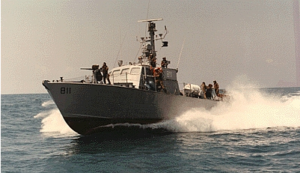CAMERA’s Israel office today prompts clarification about the impact of Israel’s naval blockade on the livelihood of Gaza fishermen in an otherwise informative, in-depth article about the Israeli navy’s efforts to block Hamas’ smuggling of weapons into the Gaza Strip (“Intel, critical thinking and constant vigilance in Navy’s toolbox to foil Hamas)“). A highly misleading (at best) passage in the March 31 article had stated:
The blockade has had a particularly negative effect on fishermen, who cannot stray too far from the shore without facing the threat of Israeli fire. As a result, the shallow waters adjacent to the coast have been overfished, diminishing hauls, and thus profits, over time.
While the Times of Israel’s source for the claim about diminished haul and profits deriving specifically from shallow waters is unclear and thus the veracity of the information is difficult to check, data from the Palestinian Central Bureau of Statistics demonstrates that total haul which Gaza fishermen brought in has dramatically increased since the blockade was imposed, a point that Times of Israel previously clarified last December. According to the PCBS, Gaza fishermen caught 1,524,913 fish in 2009. (See Table 3). After another decade of the Israeli blockade, that figure climbed to 3,943,369 in 2019. In 2007, Gaza fishermen caught 2701 metric tons of fish. That figure grew to 3943.4 metric tons by 2019. In addition, in 2005, two years before the blockade was imposed in 2007, 707 fishing boats were in Gaza. By 2019, a dozen years into the blockade, that figure more than doubled to 1,739.
Notably, a significant CAMERA-prompted New York Times editor’s note in December 2022 commendably clarified:
An article last Sunday about the struggles of Gaza’s fishing sector omitted important context surrounding the impact of Israel’s blockade on the industry, leaving the impression that the industry had been devastated. While the blockade has led to a shortage of parts needed to keep some fishing boats operational, the annual catch has varied from year to year. The current catch is higher than that in the early years of blockade.
In response to communication from CAMERA, The Times of Israel again today clarified, adding the following essential information:
Nonetheless, figures from the Palestinian Central Bureau of Statistics indicate that Gaza fishermen have more than doubled their catch since the blockade was introduced — from over 1.5 million fish in 2009 to almost 4 million in 2019.

